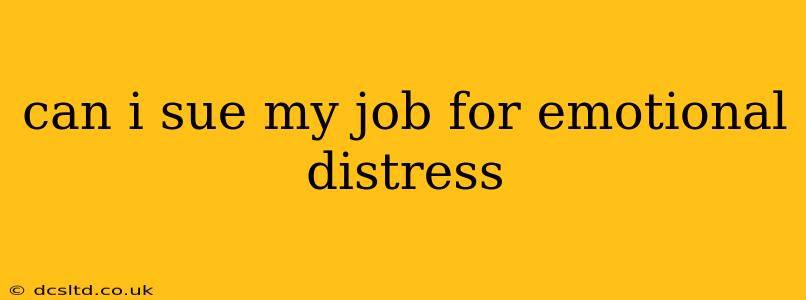Can I Sue My Job for Emotional Distress? Navigating Workplace Stress and Legal Recourse
Experiencing emotional distress at work is unfortunately common. The constant pressure of deadlines, difficult colleagues, or a toxic work environment can take a significant toll on mental health. But can you sue your employer for this distress? The answer is complex and depends heavily on the specifics of your situation and the laws in your jurisdiction. This article will explore the factors that determine whether you have a valid claim.
What Constitutes a Valid Claim for Emotional Distress in the Workplace?
To successfully sue your job for emotional distress, you generally need to demonstrate that your employer's actions (or inactions) caused your distress and that those actions were egregious enough to meet the legal standard. This often involves proving:
-
Intentional Infliction of Emotional Distress (IIED): This is the most common legal claim used in these cases. IIED requires showing that your employer engaged in extreme and outrageous conduct that intentionally or recklessly caused you severe emotional distress. Simply having a stressful job is not enough; the conduct must be far beyond the bounds of acceptable workplace behavior. Examples might include:
- Constant harassment or bullying: This could involve verbal abuse, threats, or intimidation.
- Discrimination or hostile work environment: Based on factors like race, religion, gender, or age.
- Retaliation: For reporting illegal activity or whistleblowing.
- Wrongful termination: If you were fired in a manner that was particularly cruel or humiliating.
-
Negligent Infliction of Emotional Distress (NIED): This claim is less common and harder to prove. It requires showing that your employer owed you a duty of care, breached that duty, and that breach directly caused your emotional distress. This often involves situations where the employer knew or should have known about a dangerous or harmful condition in the workplace but failed to address it.
What Evidence Do I Need?
Gathering strong evidence is crucial for a successful lawsuit. This could include:
- Documentation: Emails, letters, performance reviews, medical records detailing your emotional distress, and any formal complaints you filed with your employer.
- Witness Testimony: Colleagues or supervisors who witnessed the events that caused your distress can provide valuable support.
- Expert Testimony: A mental health professional can testify about the severity of your emotional distress and its connection to your workplace experiences.
Can I Sue for Stress Related to Workload?
Simply being overworked or stressed due to a heavy workload is rarely sufficient grounds for an emotional distress lawsuit. While excessive workload can contribute to stress and burnout, it generally doesn't meet the legal threshold of "extreme and outrageous conduct" required for IIED. However, if excessive workload is a result of discrimination or harassment, it could be part of a broader claim.
What About Constructive Discharge?
Constructive discharge occurs when your employer makes working conditions so intolerable that a reasonable person would feel forced to quit. If you can prove constructive discharge due to emotional distress caused by your employer's actions, you may have grounds for a lawsuit.
What Are My Options Before Filing a Lawsuit?
Before initiating legal action, consider exploring alternative dispute resolution methods such as:
- Mediation: A neutral third party helps facilitate communication and find a mutually agreeable solution.
- Arbitration: A neutral arbitrator hears evidence and makes a binding decision.
What Should I Do If I Believe I Have a Case?
If you believe your employer's actions caused you severe emotional distress, consult with an employment lawyer in your jurisdiction. They can assess the specifics of your case and advise you on the best course of action. Remember, laws vary from state to state, and legal advice tailored to your situation is essential.
Disclaimer: This information is for educational purposes only and should not be considered legal advice. Always consult with a qualified legal professional for advice related to your specific situation.
